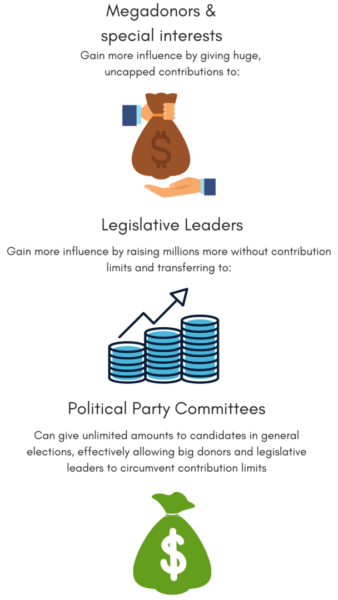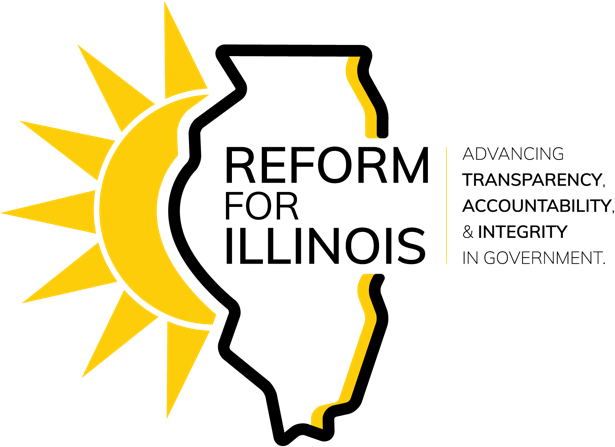RFI Statement: Party leaders boost their power, hurt independent primary candidates with last-minute campaign finance move
The legislature also failed to address election threats from AI-generated “deepfakes”
At a time when we are increasingly alarmed by the concentration of money and power in the hands of a few, Reform for Illinois is disappointed that the Illinois General Assembly just took another step back from a fair and equitable political system.
As the holiday weekend began, lawmakers in both chambers voted to remove all caps on transfers from political party committees to candidates during primary elections. Previously, caps were only absent in general elections.
This change will allow party leaders to funnel unlimited funds to their favored primary candidates. It will further increase the leaders’ power and the power of big donors while undermining the ability of more independent contenders to win their party’s nomination.
The extensive omnibus bill that includes the change will now go to Governor Pritzker’s desk.
For years, legislative leaders of both parties have taken advantage of the so-called “self-funding loophole” by loaning themselves the requisite $100,000 to remove contribution caps from their races. They then rake in hundreds of thousands in unlimited donations from wealthy individuals and special interests. This allows them to pay themselves back for the loan and to channel large or, in general elections, unlimited amounts through party committees to their favored candidates.
 This graphic shows how party leaders use current law when they trigger the self-funding loophole to take in uncapped donations and funnel them to favored candidates.
This graphic shows how party leaders use current law when they trigger the self-funding loophole to take in uncapped donations and funnel them to favored candidates.
Until now, legislative leaders were only able to make unlimited transfers from their party committees to candidates during general elections. Now they’ll be able to make unlimited transfers during primaries, too.
Under the current law, party transfers during primaries are not unlimited but are still exceptionally high — $200,000 for statewide races, $125,000 for state senate races, and $75,000 for state house races, along with limits for judicial, county, and local candidates. Removing even these high limits is a significant move that reflects party leaders’ intent to gain more control over primary elections – often the only meaningful contests in a state with many “safe” districts.
Incumbent Democratic State Senator Natalie Toro’s recent primary election may shed some light on the motivation for the change. Toro received more than $1.8 million from Senate President Harmon’s party committee, ISDF, during her primary campaign – but still lost to a progressive challenger, Graciela Guzman. Our analysis in the lead-up to the primary showed that Toro had received more than 69% of her campaign’s total fundraising from ISDF alone. This massive influx of party cash would not have been possible had the restrictions on party primary contributions been in place. Harmon’s ISDF committee was initially capped at contributing $125K to Toro’s primary campaign until another candidate’s self-funding removed all contribution limits in that race in December.
Most states impose limits on party contributions to candidates, with the federal government limiting them to $5,000. This leaves Illinois behind much of the country in providing for fair, equitably financed elections.
“Even Mike Madigan didn’t do this,” said Alisa Kaplan, executive director of Reform for Illinois. “It’s a step backward that will increase legislative leaders’ power over their members while supercharging the election money arms race and depriving constituents of the chance to be represented by more independent candidates.”
The recently passed bill also removes limits on donations by candidates to party committees during certain periods, allowing legislative leaders to further exploit the self-funding loophole and build slush funds to control their caucuses. Reform for Illinois has proposed several ways to address problems with the self-funding mechanism that fuels this system.
The sprawling election omnibus bill (HB 4488) was introduced on Wednesday, May 23, sailed through committees, and was approved by both chambers by Saturday, May 25, during the Memorial Day holiday weekend.
The legislature failed to address other pressing election issues including “deepfakes”
Reform for Illinois is also concerned that the legislature failed to address the urgent need to regulate the use of “deepfakes” in campaign communications. Reform for Illinois had advocated for legislation that would require election communications using deceptive deepfakes to display disclosures identifying them as such. The omission leaves Illinois voters heading into a highly charged November election without the tools they need to make informed, fact-based decisions at the ballot box.
Back
